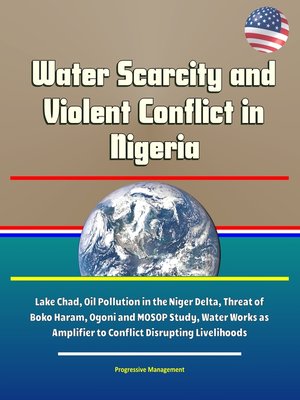Water Scarcity and Violent Conflict in Nigeria
ebook ∣ Lake Chad, Oil Pollution in the Niger Delta, Threat of Boko Haram, Ogoni and MOSOP Study, Water Works as Amplifier to Conflict Disrupting Livelihoods

Sign up to save your library
With an OverDrive account, you can save your favorite libraries for at-a-glance information about availability. Find out more about OverDrive accounts.
Find this title in Libby, the library reading app by OverDrive.



Search for a digital library with this title
Title found at these libraries:
| Library Name | Distance |
|---|---|
| Loading... |
This report has been professionally converted for accurate flowing-text e-book format reproduction. While there has been an abundance of research into answering the question of whether water scarcity causes conflict, there has not been as much research done on the contribution of water scarcity into escalation of regional conflicts. Within Nigeria there are two examples of water scarcity and conflict occurring in close proximity: the Niger Delta, and a violent conflict over oil pollution, and the ongoing threat of Boko Haram in the Lake Chad region, where water grows increasingly scarce. This study seeks to find how water scarcity in these two regions may be influencing armed conflict. To answer this question, a process-tracing method is adopted to better parse out each step along the path from scarcity to conflict. The major finding is that water scarcity works as an amplifier to conflict, especially when livelihoods are disrupted and when the government fails to take appropriate action.
I. Introduction * A. Significance of the Research Question * B. Literature Review * 1. Water Scarcity as a Direct Cause of Conflict * 2. Water Scarcity and State Institutions * 3. Water Scarcity and Migration * 4. Water Scarcity and Negative Impact on Livelihoods * C. Potential Explanations and Hypotheses * D. Research Design * E. Thesis Overview * II. The Lake Chad Basin and Boko Haram * A. Introduction and Overview * B. Lake Chad and Regional Water Security * C. Mitigating Lake Recession * D. Overview of Conflict * E. Socio-Economics of the Lake Chad Basin * F. Regional Livelihoods and the Pull of Extremism * G. Discussion * III. Oil Pollution and Violence in the Niger Delta * A. Introduction * B. Oil Discovery and Early Development * C. Oil Pollution and Its Impacts * D. Socioeconomic Impacts of Oil on Livelihoods * E. Legal Challenges for Delta Communities * F. Ogoni and MOSOP Case Study * G. Current Events * H. Conclusion and Findings * IV. Conclusion * A. Findings * B. Suggestions for Further Research. * C. Policy Solutions
This compilation includes a reproduction of the 2019 Worldwide Threat Assessment of the U.S. Intelligence Community.
Water is one of the world's most precious resources, and it is becoming increasingly scarce in many places around the globe. One country in particular facing water scarcity is Nigeria. In the Nigerian portion of the African Sahel, local populations struggle to find adequate clean drinking water. According to a Brookings Institution Report, Lake Chad has shrunk by nearly 90% since its most recent highpoint in the 1960s. Concomitantly, Nigeria has seen a rise in violence between groups of pastoral farmers as well as increased insurgent activity from Boko Haram. Furthermore, insurgent groups in the Niger Delta are engaged in activities to undermine the oil industry that has polluted the environment there with impunity for decades. The research question motivating this thesis is: how has water scarcity contributed to violence in Nigeria? There are some environmental security researchers who state that water scarcity may lead directly to conflict. In reality, the role that water scarcity plays in rates of armed conflict is more nuanced. Conflict does not always occur where water scarcity exists. However, in Nigeria, there are several cases in which water scarcity and conflict are occurring in tandem.







